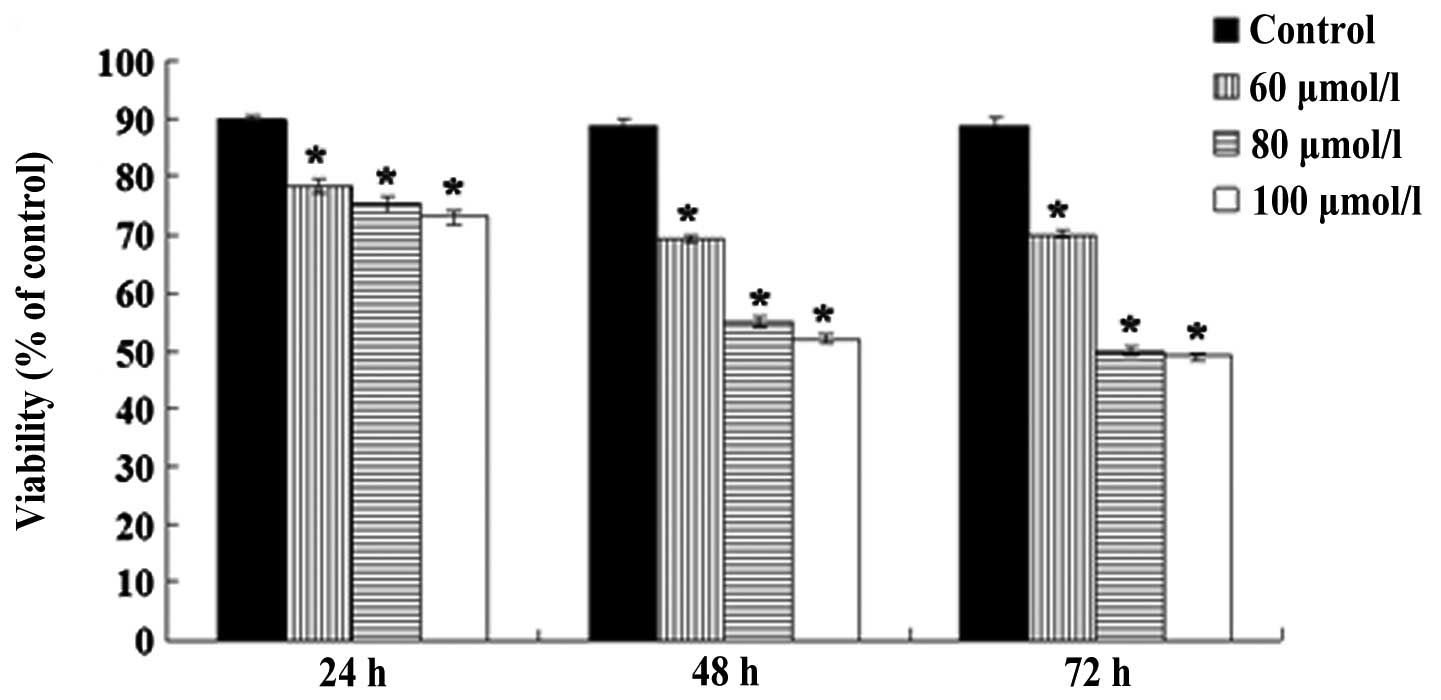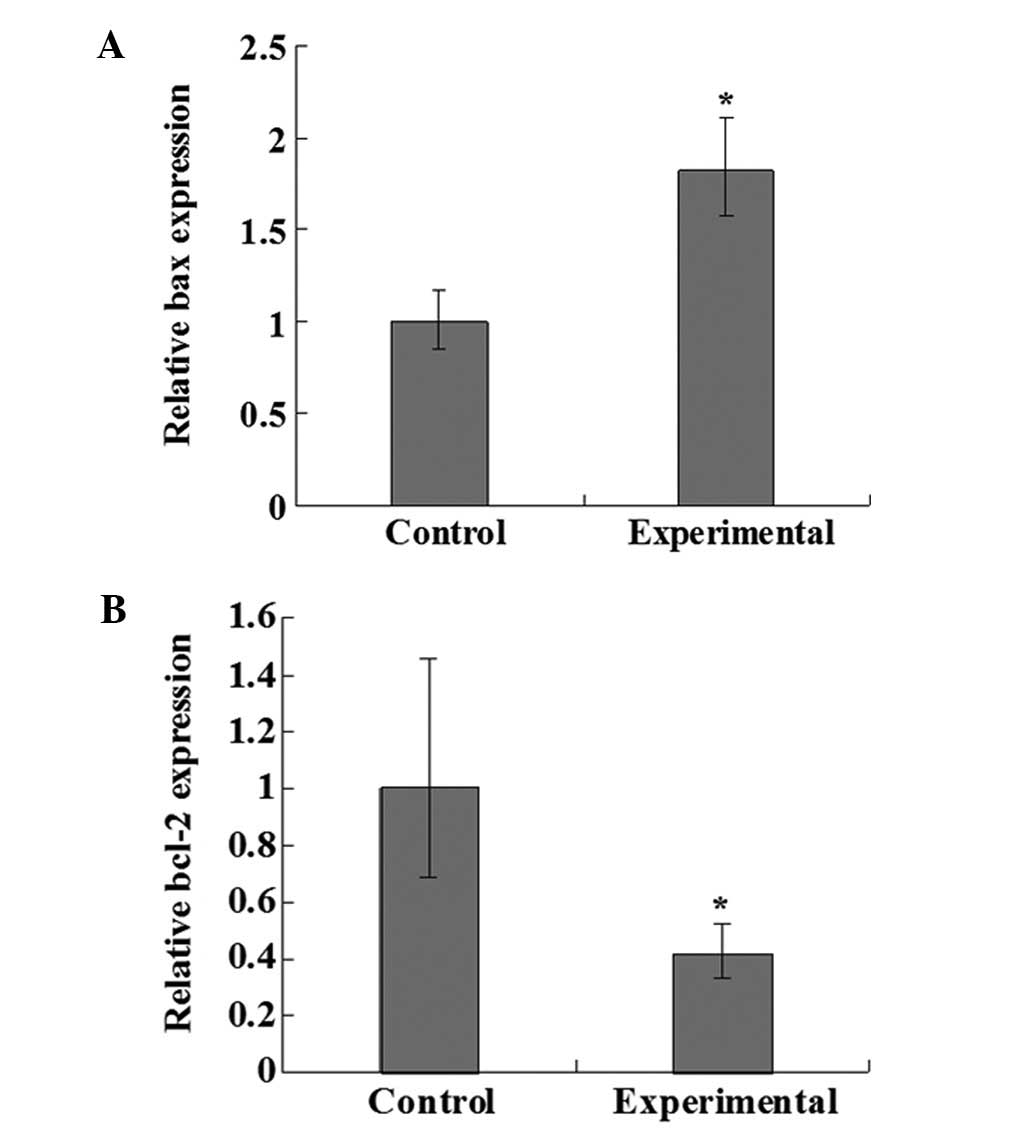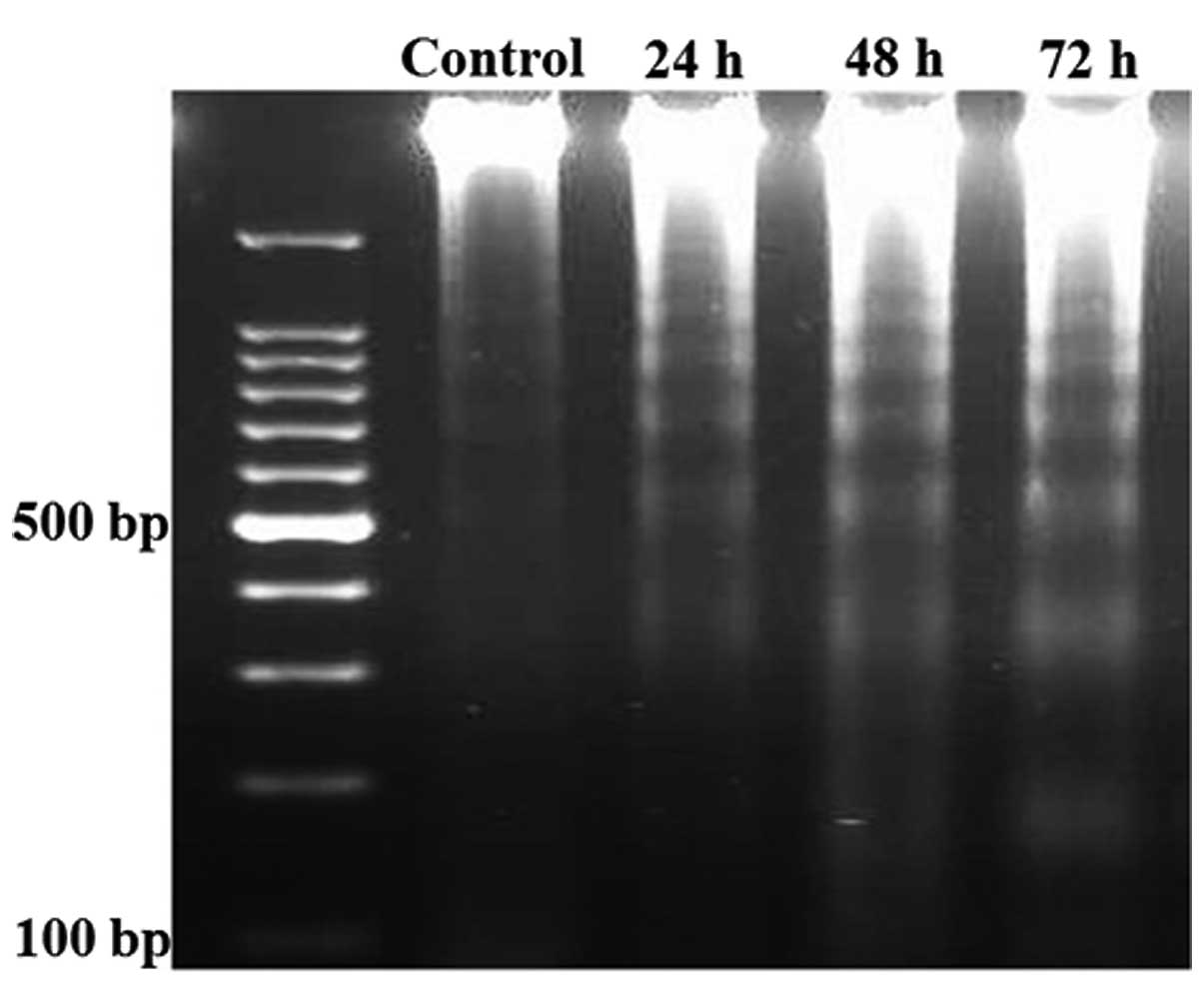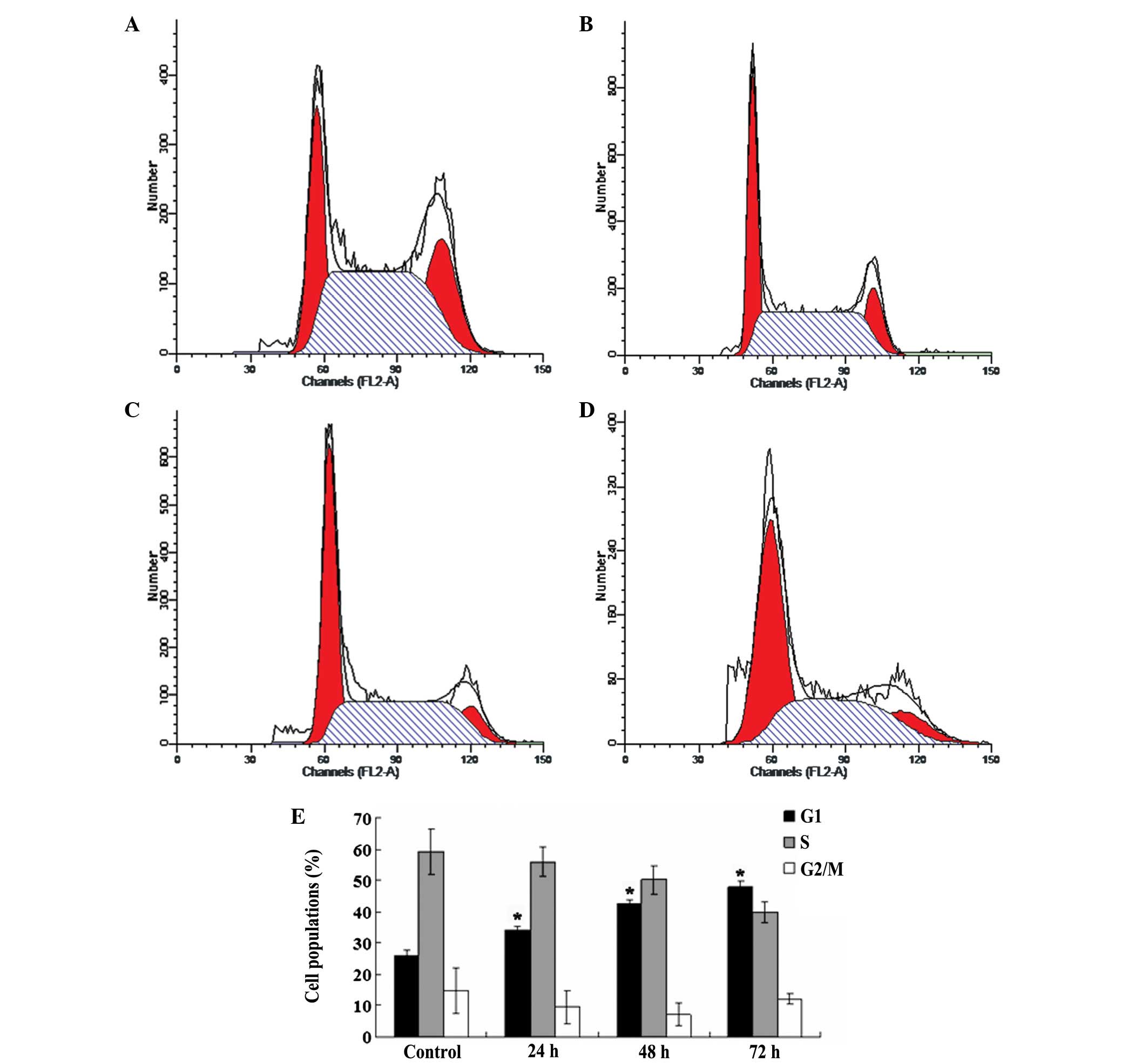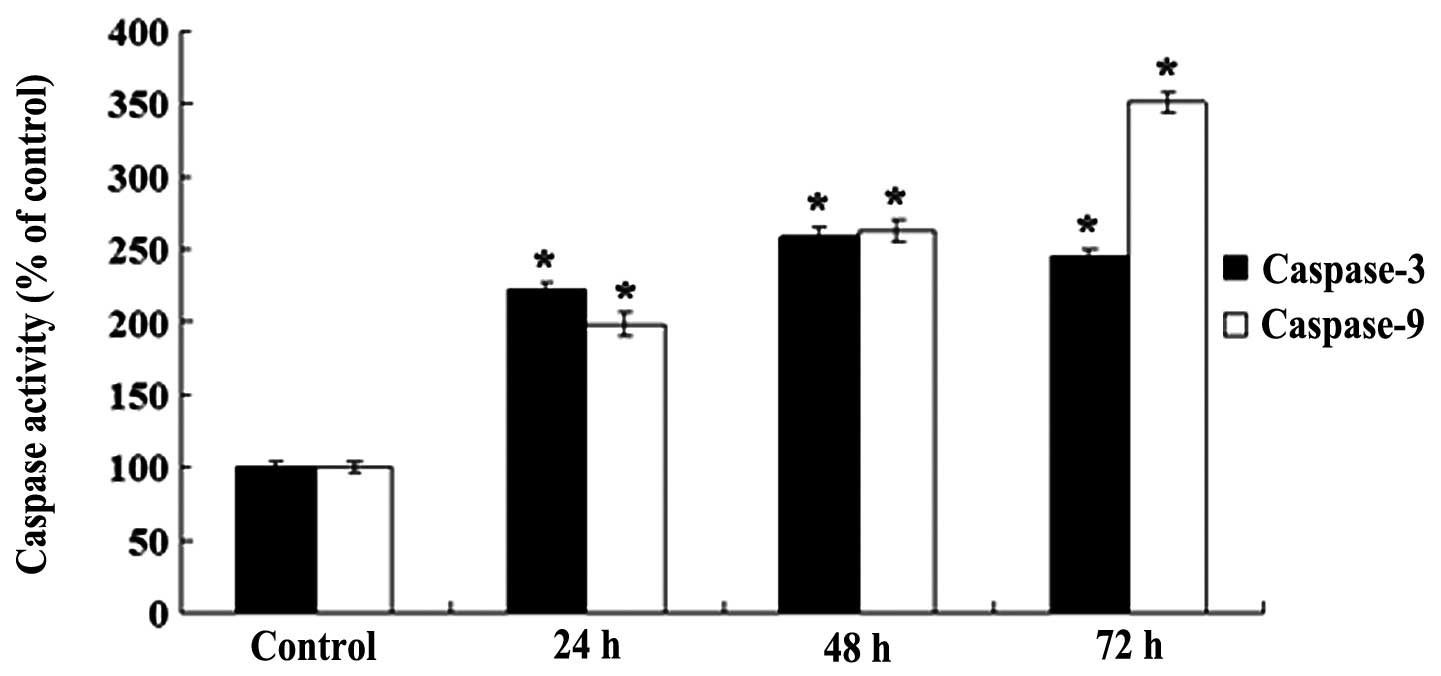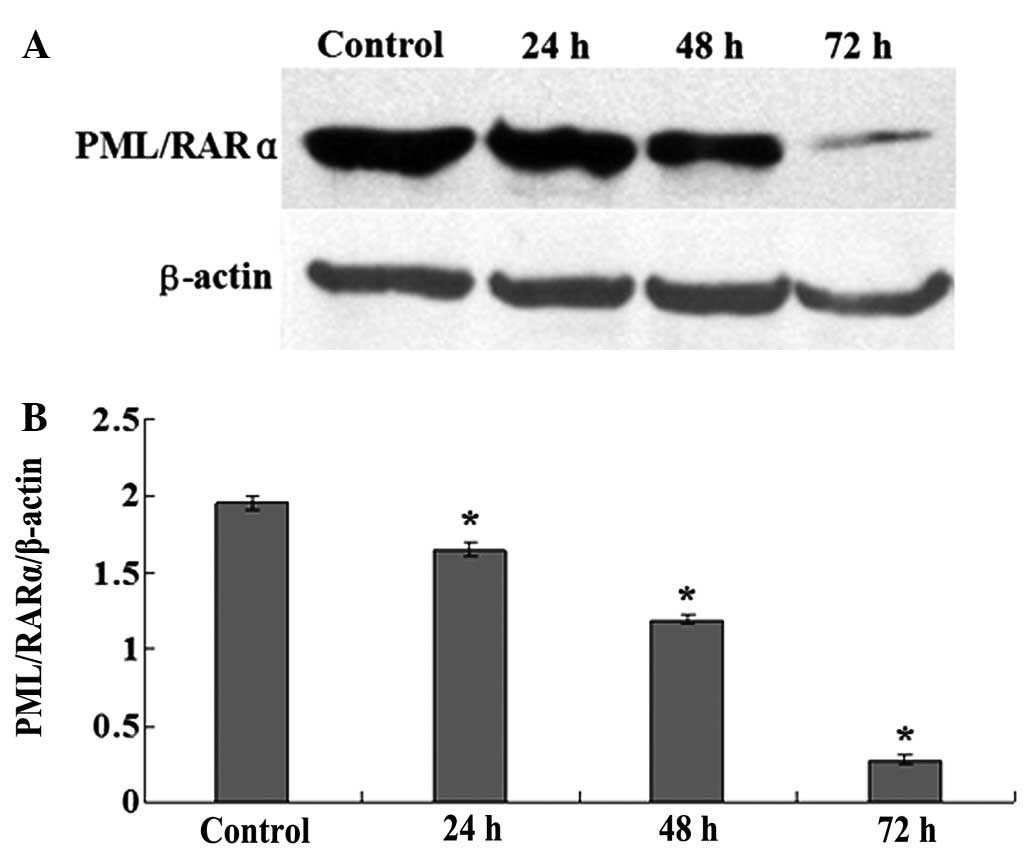|
1
|
Wang ZY and Chen Z: Acute promyelocytic
leukemia: from highly fatal to highly curable. Blood.
111:2505–2515. 2008. View Article : Google Scholar : PubMed/NCBI
|
|
2
|
Kwong YL: Pathogenesis and treatment of
leukemia: an Asian perspective. Expert Opin Ther Targets. 16(Suppl
1): S37–S43. 2012. View Article : Google Scholar
|
|
3
|
Li M, Sun K, Redelman D, Welniak LA and
Murphy WJ: The triterpenoid CDDO-Me delays murine acute
graft-versus-host disease with the preservation of
graft-versus-tumor effects after allogeneic bone marrow
transplantation. Biol Blood Marrow Transplant. 16:739–750. 2010.
View Article : Google Scholar : PubMed/NCBI
|
|
4
|
Sultana N and Ata A: Oleanolic acid and
related derivatives as medicinally important compounds. J Enzyme
Inhib Med Chem. 23:739–756. 2008. View Article : Google Scholar : PubMed/NCBI
|
|
5
|
Ovesná Z, Vachálková A, Horváthová K and
Tóthová D: Pentacyclic triterpenoic acids: new chemoprotective
compounds. Minireview Neoplasma. 51:327–333. 2004.PubMed/NCBI
|
|
6
|
Kim NY, Lee MK, Park MJ, et al: Momordin
Ic and oleanolic acid from Kochiae Fructus reduce carbon
tetrachloride-induced hepatotoxicity in rats. J Med Food.
8:177–183. 2005. View Article : Google Scholar : PubMed/NCBI
|
|
7
|
Patil CR, Jadhav RB, Singh PK, Mundada S
and Patil PR: Protective effect of oleanolic acid on gentamicin
induced nephrotoxicity in rats. Phytother Res. 24:33–37. 2010.
View Article : Google Scholar : PubMed/NCBI
|
|
8
|
Singh GB, Singh S, Bani S, Gupta BD and
Banerjee SK: Anti-inflammatory activity of oleanolic acid in rats
and mice. J Pharm Pharmacol. 44:456–458. 1992. View Article : Google Scholar : PubMed/NCBI
|
|
9
|
Giner-Larza EM, Máñez S, Recio MC, Giner
RM, Prieto JM, Cerdá-Nicolás M and Ríos JL: Oleanonic acid, a
3-oxotriterpene from Pistacia, inhibits leukotriene synthesis and
has anti-inflammatory activity. Eur J Pharmacol. 428:137–143. 2001.
View Article : Google Scholar : PubMed/NCBI
|
|
10
|
Hsu HY, Yang JJ and Lin CC: Effects of
oleanolic acid and ursolic acid on inhibiting tumor growth and
enhancing the recovery of hematopoietic system postirradiation in
mice. Cancer Lett. 111:7–13. 1997. View Article : Google Scholar : PubMed/NCBI
|
|
11
|
Kim YK, Yoon SK and Ryu SY: Cytotoxic
triterpenes from stem bark of Physocarpus intermedius.
Planta Med. 66:485–486. 2000. View Article : Google Scholar : PubMed/NCBI
|
|
12
|
Li J, Guo WJ and Yang QY: Effects of
ursolic and oleanolic acid on human colon carcinoma cell line
HCT15. World J Gastroenterol. 8:493–495. 2002.PubMed/NCBI
|
|
13
|
Zhang P, Li H, Chen D, Ni J, Kang Y and
Wang S: Oleanolic acid induces apoptosis in human leukemia cells
through caspase activation and poly(ADP-ribose) polymerase
cleavage. Acta Biochim Biophys Sin (Shanghai). 39:803–809. 2007.
View Article : Google Scholar : PubMed/NCBI
|
|
14
|
Hengartner MO: The biochemistry of
apoptosis. Nature. 407:770–776. 2000. View
Article : Google Scholar : PubMed/NCBI
|
|
15
|
Okada H and Mak TW: Pathways of apoptotic
and non-apoptotic death in tumor cells. Nat Rev Cancer. 4:592–603.
2004. View
Article : Google Scholar : PubMed/NCBI
|
|
16
|
Roninson IB, Broude EV and Chang BD: If
not apoptosis, then what? Treatment-induced senescence and mitotic
catastrophe in tumor cells. Drug Resist Updat. 4:303–313. 2001.
View Article : Google Scholar : PubMed/NCBI
|
|
17
|
Wang B and Jiang ZH: Studies of oleanolic
acid. Chinese Pharmaceutical Journal. 27:393–397. 1992.
|
|
18
|
Lúcio KA, da Rocha GG, Monção-Ribeiro LC,
Fernandes J, Takiya CM and Gattass CR: Oleanolic acid initiates
apoptosis in non-small cell lung cancer cell lines and reduces
metastasis of a B16F10 melanoma model in vivo. PLoS One.
6:e285962011.PubMed/NCBI
|
|
19
|
Fernandes J, Castilho RO, da Costa MR,
Wagner-Souza K, Coelho Kaplan MA and Gattass CR: Pentacyclic
triterpenes from Chrysobalanaceae species: cytotoxicity on
multidrug resistant and sensitive leukemia cell lines. Cancer Lett.
190:165–169. 2003.
|
|
20
|
Tokuda H, Ohigashi H, Koshimizu K and Ito
Y: Inhibitory effects of ursolic and oleanolic acid on skin tumor
promotion by 12-O-tetradecanoylphorbol-13-acetate. Cancer Lett.
33:279–285. 1986. View Article : Google Scholar : PubMed/NCBI
|
|
21
|
Choi CY, You HJ and Jeong HG: Nitric oxide
and tumor necrosis factor-alpha production by oleanolic acid via
nuclear factor-kappaB activation in macrophages. Biochem Biophys
Res Commun. 288:49–55. 2001. View Article : Google Scholar : PubMed/NCBI
|
|
22
|
Lee HY, Chung HY, Kim KH, Lee JJ and Kim
KW: Induction of differentiation in the cultured F9 teratocarcinoma
stem cells by triterpene acids. J Cancer Res Clin Oncol.
120:513–518. 1994. View Article : Google Scholar : PubMed/NCBI
|
|
23
|
Sohn KH, Lee HY, Chung HY, Young HS, Yi SY
and Kim KW: Anti-angiogenic activity of triterpene acids. Cancer
Lett. 94:213–218. 1995. View Article : Google Scholar : PubMed/NCBI
|
|
24
|
Rego EM and Pandolfi PP: Analysis of the
molecular genetics of acute promyelocytic leukemia in mouse models.
Semin Hematol. 38:54–70. 2001. View Article : Google Scholar : PubMed/NCBI
|
|
25
|
Dalton WT Jr, Ahearn MJ, McCredie KB,
Freireich EJ, Stass SA and Trujillo JM: HL-60 cell line was derived
from a patient with FAB-M2 and not FAB-M3. Blood. 71:242–247.
1988.PubMed/NCBI
|















